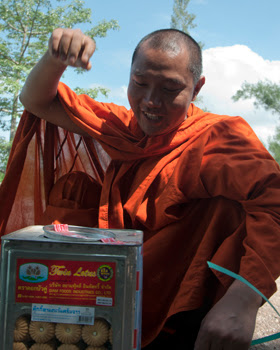Press Release
By Mae Tao Clinic
On the 18th December Her Royal Highness Princess Maha Chakri Sirindhorn presented Dr Cynthia Maung, Director of Mae Tao Clinic with an honorary doctorate in medicine from Ubon Ratchathani University (UBU). This is the first time that an academic institution in Thailand has provided such high recognition of the work of Dr Cynthia and her staff at Mae Tao Clinic. The award was given in recognition of Dr Cynthia’s work in taking care of refugees and displaced people affected by war and helping underprivileged patients in the midst of ethnic conflict.
Dr Cynthia was honoured to also have the opportunity to address the staff and faculty members on the 17th December and to provide an inspirational speech to new graduates on the 18th December.
Dr Cynthia pointed out the link between the work of Mae Tao Clinic and that of Ubon Ratchathani University, since both institutions work in border areas of Thailand with vulnerable and mobile populations from Burma and Laos. Both UBU and Mae Tao Clinic believe that training local people to work with their own communities is the best approach to public health. They are both also committed to supporting the work of the Thai government’s Border Health Master Plan, which promotes the provision of health care to all people living in Thailand, including migrants and ethnic people.
In her speech, Dr Cynthia urged graduating students to develop an approach to health that looks not just at the disease process and treatment but at all the underlying factors of the broader definition of health that is the social and economic aspects of health. Dr Cynthia highlighted the constant dilemma of working in a low resource setting, but emphasized her belief that: “Every patient should have the right to access health care and not have to remove their child from school, or go hungry or delay treatment due to structural barriers to health services, whether they be economic, social, or otherwise.”
She reflected on the current situation in Burma, explaining that although there have been some political shifts, “It remains a chronic health catastrophe.” Government health expenditure is just 3% of the country’s GDP compared to Thailand’s 12.7%. This has resulted in official health indicators in Burma, such as maternal mortality ratios and infant and child mortality rates, being amongst the worst in the region.
Dr Cynthia highlighted that the inspiration for her work has been the communities themselves. She explained that in times of government neglect and abuse, the communities work together for community health and education, developing local solutions and innovations in very challenging circumstances. “It is from this resiliency of communities that community leaders emerge. They learn to work together, share resources and develop strong supportive networks, developing innovative responses to truly provide public health.”
“Dr. Cynthiakah was nominated by the College of Medicine and Public Health to receive an honorary Doctorate degree in Medicine. The Ubon Ratchathani University Council have now approved the award to be presented to Dr Cynthiakah. Dr. Cynthiakah is an illustrious example of a medical doctor who has devoted her life to taking care of refugees and displaced people affected by war and ethnic conflict. She has devoted herself to helping underprivileged patients with limited resources. She embodies the spirit of a true humanitarian. She is a role model for medical and public health professionals who bring benefits to the nation and to international communities” states Ubon Ratchathani University.
For more information, contact:
Naw Ghay Pho (Thai language): +66(0)800298297
Eh Thwa (English/Burmese languages): +66(0)810448521
Dr Cynthia Maung is the Director of Mae Tao Clinic in Mae Sot, Tak. For her work in health and human rights she has received multiple awards including the Sydney Peace Prize of Australia, The One Award of Hong Kong and the Ramon Magsaysay Award of the Philippines for Community Leadership.
Mae Tao Clinic was established in 1989 after the Burmese government crackdown on nationwide pro-democracy demonstrations across Burma. From a small 4-bed clinic in 1990 to the present time when there are over 140,000 patients visits per year with over 3,000 safe baby deliveries. Nowadays, Mae Tao Clinic is a comprehensive health centre, as well as a training centre which has trained thousands of health workers who have returned to Burma to work in rural and war affected areas of Eastern Burma. It also provides education and child protection to migrant children in the area.






























